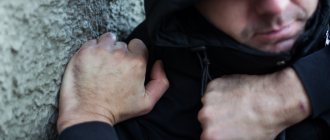Exceeding the necessary self-defense measures is a very controversial situation that requires the immediate intervention of an experienced lawyer. Vague wording in regulatory legal documents and individual understanding of the necessary defense lead to the fact that criminal cases under Articles 108 and 114 of the Criminal Code of the Russian Federation are initiated quite often. Each person has his own understanding of the limits of defense: for one it is physical impact without any means, for others it is the use of improvised objects, and still others believe that to protect life and health one can use bladed weapons, firearms or traumatic weapons. Judicial practice shows that the investigation often exaggerates the severity of the crime, sending people to the dock under Article 108 of the Criminal Code of the Russian Federation who had no other choice but to protect themselves and their loved ones.
The accusatory bias towards such cases on the part of the investigative authorities, the prosecutor's office and the court is quite understandable. Officials are sometimes afraid to accept responsibility in situations where the defender has caused moderate or severe harm to health or even killed the attacker. Death is a reason to initiate a criminal case, and judicial statistics are inexorable: only a few cases out of a thousand end in acquittals. It is for this reason that exceeding the limits of permissible self-defense, resulting in death or serious harm to health, is a highly specialized issue subject only to a competent lawyer.
We will respond within 60 seconds
Free consultation+7
Necessary self-defense and the Criminal Code of the Russian Federation
Despite the ambiguity in the interpretation of many situations, the definition of necessary self-defense is provided for by law. The limits are regulated by Articles 37 and 39 of the Criminal Code of the Russian Federation. Thus, the defender can be released from criminal liability if it is proven that his actions did not exceed permissible limits. Separately, the courts consider situations where exceeding the limits of self-defense resulted in the death of the attacker.
- According to Article 37, persons who were forced to defend the rights, freedoms and lives (themselves and third parties) are exempt from criminal liability, but only if it was established that the attacker’s actions were associated with a threat or open violence. If the defender was taken by surprise at night in his own home, where he did not have the opportunity to quickly assess the situation and make an objective decision, then the limits of necessary defense are usually not considered to be exceeded. All categories of citizens fall under the jurisdiction of Article 37; possession of special skills of physical influence does not matter.
- Article 39 clearly defines the concept of extreme necessity. The first subparagraph states that causing harm to health in case of emergency is not considered a criminal offense. The second subparagraph establishes exceeding the limits of defense when the degree of threat and the degree of harm caused to the attacker are incommensurable.
A separate legal issue is exceeding the limits of self-defense, resulting in death. In such situations, a criminal case is initiated under Article 108 of the Criminal Code of the Russian Federation. If serious or moderate harm to the health of the attacker is caused, the actions of the defender are qualified under Article 114.
To clearly understand the limits of permissible defense, it is necessary to establish the proportionality of defense and attack. When determining proportionality, it is important to take into account the timing of the attack and the element of surprise. As an example, consider a situation where a bully or potential robber with a stick in his hands attacks a victim who is carrying a traumatic pistol. Shooting at an attacker is an excess of self-defense due to the lack of proportionality of the threat, and the committed action, depending on the consequences, will be qualified under Article 114 or Article 108 of the Criminal Code of the Russian Federation.
The legality of self-defense occurs only in the following situations:
- When defending, only the attacker received damage;
- The defense and means were proportionate to the attack;
- The attackers acted realistically, even if there was no physical contact.
The extreme necessity discussed in Article 39 of the Criminal Code of the Russian Federation differs significantly from necessary self-defense:
- Occurs when there is a real threat to human life;
- Allows harm not only to attackers, but also to third parties;
- The damage caused to the attacker is less than the potential damage caused to the victim due to his inaction.
Thus, the legality of the defense is determined by the investigative authorities collectively based on the following factors:
- Proportionality;
- Timeliness of actions;
- Definition of the object of protection;
- Direction of action.
Courts must take into account the timing of the attack or the factor of surprise. Even in serious cases, if the victim was physically unable to assess the nature of the criminal’s actions and choose a proportionate means of defense, then she is exempt from criminal liability.
What is the limit of necessary defense
Acceptable self-defense, which is referred to in Art. 114 of the Criminal Code of the Russian Federation are actions designed to stop the criminal by all legal means, but not to cause him serious bodily harm that is not correlated with the possible damage to the defender.
How is it determined?
To bring to justice under Articles 108 and 114 of the Criminal Code of the Russian Federation, the court must prove the fact of intent - the awareness of the defender that his self-defense does not correspond to the level of danger from the attacking person. From the point of view of legislation, the defending party during an attack must foresee in advance what threat his self-defense will pose to the criminal.
Obvious signs of exceeding the permissible defense:
- intentionality of actions;
- high degree of danger of self-defense;
- obvious disproportionality of the harm caused;
- inconsistency of self-defense with the nature of the threat;
- the nature of the attacker's actions.
When determining whether the limit of necessary self-defense has been exceeded, it is important to take into account the degree of danger threatening a person, his strength and ability to repel an attack, the age of the criminal and the defender, their physical development, the use of weapons, the time and place of the action, and any other circumstances.
A competent defense attorney will certainly take into account the mental state of the person, who at the moment of self-defense could have experienced emotional disturbance caused by an attack on his health and life, and as a result, could not objectively assess the degree and nature of the threat of attack.
Permissible limits
When considering proceedings involving the use of physical force against an attacker by the victim, it is necessary to establish acceptable limits of protection.
So, the following signs must be present:
- the harm caused to the offender corresponds to the danger threatened to the victim at the time of the attack;
- the attack was unexpected, so the defending citizen could not timely assess the degree of danger, as a result of which self-defense measures were exceeded.
Unfortunately, as practice shows, these are subjective indicators that must be comprehensively assessed by the investigator conducting the pre-trial investigation and the judge making decisions on criminal proceedings.
Feature 1. Proportionality of defense to attack
As an example, we can cite a common situation - in response to an attack with a stick, the defender shoots from a traumatic pistol. The law treats this as an excess of self-defense because he could have fired into the air without injuring his attacker. Therefore, in such a situation, Article 114 of the Criminal Code is applied for causing harm to health in the process of self-defense.
Feature 2. Target of attack
In some cases, the permissible limits of self-defense may be increased. For example, in a situation where the victim has limited capabilities or is disabled. It is acceptable for him to defend himself, but it is unacceptable for him to use his special status to commit intentional crimes.
Feature 3. Threatening or attacking: is there a difference?
From the point of view of the law, these concepts are equal. Therefore, self-defense measures can be applied even before the attack itself, immediately after the threats are made.
But in practice, such an interpretation of the concepts of “attack and threat” raises many questions and disputes among lawyers. The main one concerns how to assess the threat and confirm the actual intentions of the threat? The threat in court will try to prove that he did not intend to attack, and the victim, without any reason, took his words as a call to action.
Feature 4. Exemption from liability in any case
An important feature of qualifying the limits of self-defense is the victim’s readiness to attack. The situations described above occur in a situation of anticipation of an attack. But it happens that the criminal attacks suddenly and the victim does not have time to think and think through defense options. Added to this is the sudden fear of the victim. When assessing such situations to qualify the self-defense used, the following is analyzed:
- The identity of the attacker.
- Times of Day.
- Place.
- Motives.
- The degree of threat to the health and life of the victim.
In some cases, these characteristics lead to the dismissal of any charges against the victim.
Permissible self-defense under Article 114 of the Criminal Code of the Russian Federation
Acceptable self-defense, as stated in Art. 114 of the Criminal Code of the Russian Federation, actions taken to protect one’s own life, person, or one’s property, rights, or one’s family members, which did not entail grave consequences in the form of severe bodily harm, are considered.
The intentional killing of an attacker on life is already classified as a crime under criminal law.
Unintentional - administrative or civil, depending on the circumstances.
The ideal representation of the Criminal Code of concepts of what the norm consists of is self-defense, equivalent to a threat to the same extent emanating from another person. For a better idea of how to determine this in a state of passion, or during risks that have arisen, we can consider one example.
A young woman returning from work was approached by a robber demanding money. At the same time, he put a knife to her throat. The citizen had freestyle wrestling skills. Having used them, she knocks the knife out of the attacker’s hands and manages to grab the knife in her hand. In this case, the action is not considered to have been committed in excess of defensive measures. Here her action will be recorded as equivalent to a threat.
Under the circumstances of an attack on the victim and injury to the victim, the latter has the right to resist the attacker and defend himself to the best of his ability. Here the level of aggressiveness of his actions will be determined by the nature of the consequences, whether serious harm was caused.
Estimation of limits
According to the provisions of the law, when considering the circumstances of the case, it does not take into account what physical techniques were used and whether the original victim has the necessary combat skills and training. An assessment of one's own defense measures cannot be based on one's potential to call for help without causing harm to the attacker.
As noted above, these are subjective indicators that are assessed during a judicial investigation and may lead to the transfer of the case to court or the termination of proceedings due to the absence of a criminal offense in the actions of the defending citizen.
In order to make the right decision that will protect the interests of all participants, it is necessary to study examples from judicial practice and the results of consideration of similar proceedings.
Punishment for exceeding the limits of self-defense
At the moment, the Criminal Code of the Russian Federation does not have a separate article that considers crimes committed within the framework of exceeding the limits of self-defense. The actions committed are classified depending on the degree of harm caused to the attacker - death, serious or moderate harm to health. Depending on this, the degree of responsibility of the victim also differs.
The worst case scenario is death caused by exceeding the limits of acceptable self-defense. Punishment under Article 108 provides for correctional labor, restriction or imprisonment for a maximum of 2 years.
Causing serious or moderate harm to health when exceeding the limits of self-defense is Article 114. Punishment is correctional labor, restriction or imprisonment for up to 1 year.
In legal practice, most situations are qualified under Article 114 - the use of excessive measures when detaining a person who has committed illegal actions.
- The first part of the article establishes the measure of liability if harm to health is caused during an attack.
- The second part provides for liability for causing grievous and moderate harm to health at the time of detention of a suspect in a crime.
Commentary on Article 114 of the Criminal Code of the Russian Federation
If we talk about how experienced lawyers comment on this article of criminal law, then it all comes down to voicing measures of responsibility. The magnitude of punishments are presented for the fact that the defender or the person attempting to detain the criminal was unable to calculate his strength and used motivated harshness. The general structure of the article can be represented by the following points:
- Part one talks about punishment for damage caused in defense.
- Part two is about the fact that measures were exceeded to detain the criminal.
If we compare the legislative act in question with Article 108 of the Code of Russian Criminal Law, we can find that their objects are different. At the same time, we see that the meaning is identical - relapse occurred in cases of self-organization in order to protect oneself or loved ones.
Differences by object:
- Article 108 includes causing harm to life - murder.
- Article 114 describes causing harm to health - causing bodily harm to a moderate or severe degree.
Legally, it is believed that the name of the title does not quite fit the content of the law itself. It talks about causing harm during self-defense, but in fact, it is in the paragraphs about measures of responsibility for exceeding one’s own rights when defending oneself.
In addition, it is necessary to note the motive for allowing excesses of rights, which is classified by experts as subjective. At the same time, it is possible to prove its type - indirect intent or direct intent - only if there is an evidence base. Such documents can be video files or written confirmation of eyewitness accounts.
If a person is proven guilty due to negligence, then no criminal penalties are provided for this. In this case, a person can receive either an acquittal, depending on the severity of the guilt itself, or a measure of civil or administrative liability.
Author: Kazanikova Elena Vladimirovna
Free legal consultation by phone
Dear readers! Our articles talk about typical ways to resolve legal issues, but each case is unique. If you want to find out how to solve your particular problem, please use the online consultant form on the right or call
Moscow and Moscow region +7 499 938 62 89
St. Petersburg and Leningrad region +7-812-425-13-17
You might like
Court decisions
Robbery is discord: how to achieve a lenient sentence under a “harsh” article
Article - fraud: how to get rid of unfounded accusations?
The term was reduced by 6 times: defense of the accused under Article 228.1 of the Criminal Code of the Russian Federation
They planted drugs at a disco
Mitigation of the sentence under Art. 159 part 4: is it possible to reduce the punishment for fraud on a particularly large scale?
Customer Reviews
Letter of thanks
Review by Gavrichkova A.N. I would like to express my deepest gratitude to Yuri Vladimirovich Sukhovarov for his humane attitude towards my problem and detailed professional advice on solving it. I wish I could meet such people in my life more often.
Sincerely, Gavrichkov Alexander Nikolaevich.
Gratitude from Gordeeva E.S. I express my special gratitude to Sergei Vyacheslavovich for his highly competent and detailed consultation on the issue of the employment contract.
Doctor of Philological Sciences, Gordeeva E.S. 12/01/2018
Gratitude from Busygin A.I. I express my gratitude to Vasily Anatolyevich Kavalyauskas for the qualified management of my case, competent advice and justification for the decision, which led to compensation of the stated claims.
Sincerely, Busygin Alexander Ivanovich
26.12.2017
Gratitude from gr. Moskovchuk V.G. I express my deep gratitude to lawyer Denis Yuryevich for the consultation and bringing the case to its logical conclusion. Legal documents were drawn up very competently and sent to court. The case is won. Hooray!!! Thank you very much!
Plaintiff: Moskovchuk V. G.
Thanks to Pavlyuchenko A.V. from Radhuan M. Dear Pavlyuchenko Alexander Viktorovich. Let me express my sincere gratitude for the qualified legal assistance provided. Thanks to your professionalism, I was able to achieve a decision in my favor. I wish you further prosperity and professionalism.
Radhuan Mohamed 06/08/2018
Gratitude from Matvey Fomin I, Matvey Alekseevich Fomin, am grateful to Vasily Anatolyevich Kavalyauskas for the timely legal advice and prompt assistance in resolving my issue. Calm and decisive. Thank you.
Fomin M.A.
Gratitude to Konstantin Vasilievich Solovyov I am very glad that I was accepted for a consultation with Konstantin Vasilievich Solovyov. An excellent, very competent lawyer. Please accept my gratitude for your excellent service. Thank you!
Valadze G.G. 08/17/2018
Review by Sokolov M.Yu. I express my gratitude to your company, as well as Denis Yurievich Stepanov and Daria Valentinovna Kutuzova for their conscientious attitude to their duties.
With sincere respect, Sokolov M.Yu.
Gratitude from Vraveevsky S.A. Sergey Vyacheslavovich! Thank you very much for the consultation! All the details were disclosed to me in detail, all questions were answered comprehensively. I am very glad to receive help from a qualified specialist!
Vraveevsky S.A. 12/18/2018








